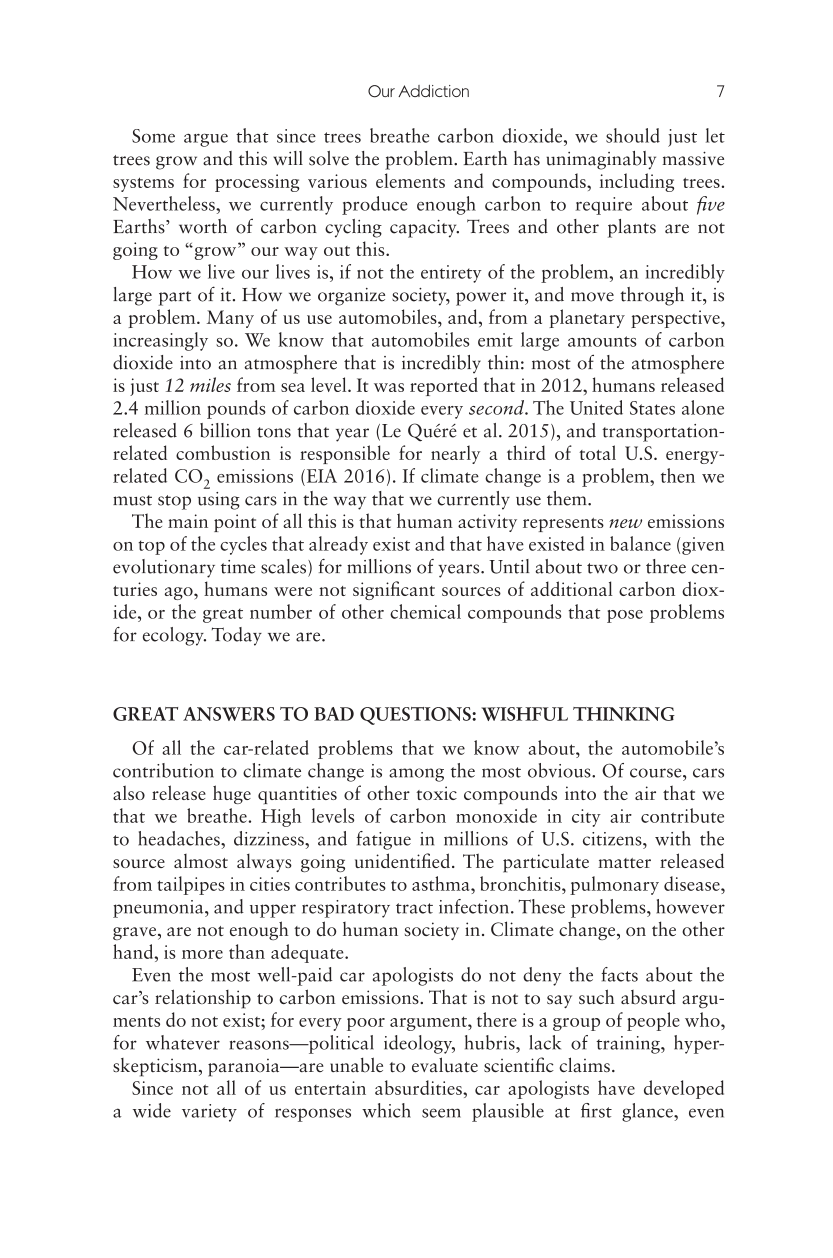Our Addiction 7
Some argue that since trees breathe carbon dioxide, we should just let
trees grow and this will solve the problem. Earth has unimaginably massive
systems for processing various elements and compounds, including trees.
Nevertheless, we currently produce enough carbon to require about five
Earths’ worth of carbon cycling capacity. Trees and other plants are not
going to “grow” our way out this.
How we live our lives is, if not the entirety of the problem, an incredibly
large part of it. How we organize society, power it, and move through it, is
a problem. Many of us use automobiles, and, from a planetary perspective,
increasingly so. We know that automobiles emit large amounts of carbon
dioxide into an atmosphere that is incredibly thin: most of the atmosphere
is just 12 miles from sea level. It was reported that in 2012, humans released
2.4 million pounds of carbon dioxide every second. The United States alone
released 6 billion tons that year (Le Quéré et al. 2015), and transportation-
related combustion is responsible for nearly a third of total U.S. energy-
related CO2 emissions (EIA 2016). If climate change is a problem, then we
must stop using cars in the way that we currently use them.
The main point of all this is that human activity represents new emissions
on top of the cycles that already exist and that have existed in balance (given
evolutionary time scales) for millions of years. Until about two or three cen-
turies ago, humans were not significant sources of additional carbon diox-
ide, or the great number of other chemical compounds that pose problems
for ecology. Today we are.
GREAT ANSWERS TO BAD QUESTIONS: WISHFUL THINKING
Of all the car-related problems that we know about, the automobile’s
contribution to climate change is among the most obvious. Of course, cars
also release huge quantities of other toxic compounds into the air that we
that we breathe. High levels of carbon monoxide in city air contribute
to headaches, dizziness, and fatigue in millions of U.S. citizens, with the
source almost always going unidentified. The particulate matter released
from tailpipes in cities contributes to asthma, bronchitis, pulmonary disease,
pneumonia, and upper respiratory tract infection. These problems, however
grave, are not enough to do human society in. Climate change, on the other
hand, is more than adequate.
Even the most well-paid car apologists do not deny the facts about the
car’s relationship to carbon emissions. That is not to say such absurd argu-
ments do not exist; for every poor argument, there is a group of people who,
for whatever reasons—political ideology, hubris, lack of training, hyper-
skepticism, paranoia—are unable to evaluate scientific claims.
Since not all of us entertain absurdities, car apologists have developed
a wide variety of responses which seem plausible at first glance, even






























































































































































































































































